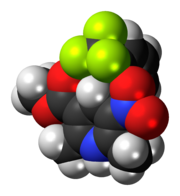Bay K8644
Appearance

| |

| |
| Names | |
|---|---|
| Preferred IUPAC name
Methyl 2,6-dimethyl-5-nitro-4-[2-(trifluoromethyl)phenyl]-1,4-dihydropyridine-3-carboxylate | |
| Identifiers | |
3D model (JSmol)
|
|
| ChEBI | |
| ChEMBL | |
| ChemSpider | |
| ECHA InfoCard | 100.163.930 |
| EC Number |
|
PubChem CID
|
|
CompTox Dashboard (EPA)
|
|
| |
| |
| Properties | |
| C16H15F3N2O4 | |
| Molar mass | 356.301 g·mol−1 |
| Insoluble | |
| Solubility in other solvents | DMSO: 184 mg/mL; methanol and ethanol: 63 mg/mL |
| Hazards | |
| GHS labelling: | |

| |
| Warning | |
| H315, H319 | |
| P264, P280, P302+P352, P305+P351+P338, P321, P332+P313, P337+P313, P362 | |
Except where otherwise noted, data are given for materials in their standard state (at 25 °C [77 °F], 100 kPa).
| |
Bay K8644 is a chemical compound that functions as an L-type calcium channel agonist. Bay K8644 is used primarily as a biochemical research tool for this effect.[2] It is a structural analog of nifedipine with positive inotropic activity, and as an aromatic it is highly lipid soluble.
Mechanism of action
[edit]Bay K8644 targets L-type voltage-gated calcium channels. It is the first positive inotropic agent shown to act specifically and directly on calcium channels.[3]
References
[edit]- ^ (±)-Bay K8644 at Sigma-Aldrich
- ^ CID 2303 from PubChem
- ^ Thomas, G; Chung, M; Cohen, CJ (January 1985). "A dihydropyridine (Bay k 8644) that enhances calcium currents in guinea pig and calf myocardial cells. A new type of positive inotropic agent". Circ Res. 56 (1): 87–96. doi:10.1161/01.res.56.1.87. PMID 2578336.
